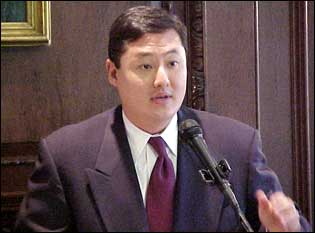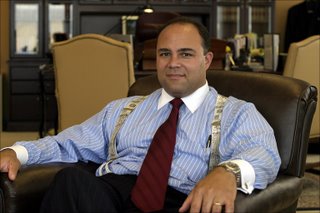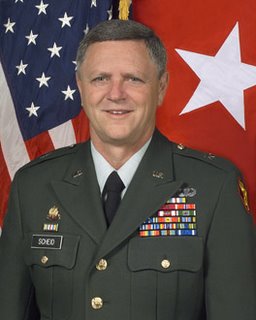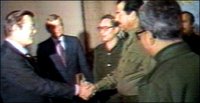
Yesterday, the Senate passed S. 3930, a bill originally entitled the Bringing Terrorists to Justice Act of 2006, but enacted as the Military Commissions Act. To the vast majority of people in this country, that is an unremarkable - if not outright boring - event. As it happens however, S. 3930 represents nothing less than a successful frontal assault on the fundamental definition of what it means to be an American, and a forfeiture of basic rights enshrined in the Constitution.
S. 3930 was introduced to the Senate at the behest of the Bush Administration, where it immediately drew fire. On September 12th, a laundry list of distinguished armed forces veterans - including former Chairman of the Joint Chiefs of Staff John Shalikashvili and former Director of Central Intelligence (and Admiral) Stansfield Turner - wrote a letter to the Senate Armed Services Committee. In it, they expressed their alarm:
We believe that the language that would redefine Common Article 3 of the Geneva Conventions as equivalent to the standards contained in the Detainee Treatment Act [NOTE: The Detainee Treatment Act was an early version of the legislation that would become the Military Commissions Act] violates the core principles of the Geneva Conventions and poses a grave threat to American service-members, now and in future wars.
... Common Article 3 of the Geneva Conventions provides the minimum standards for humane treatment and fair justice that apply to anyone captured in armed conflict. These standards were specifically designed to ensure that those who fall outside the other, more extensive, protections of the Conventions are treated in accordance with the values of civilized nations. The framers of the Conventions, including the American representatives, in particular wanted to ensure that Common Article 3 would apply in situations where a state party to the treaty, like the United States, fights an adversary that is not a party, including irregular forces like al Qaeda. The United States military has abided by the basic requirements of Common Article 3 in every conflict since the Conventions were adopted. In each case, we applied the Geneva Conventions -- including, at a minimum, Common Article 3 -- even to enemies that systematically violated the Conventions themselves.
We have abided by this standard in our own conduct for a simple reason: the same standard serves to protect American servicemen and women when they engage in conflicts covered by Common Article 3. Preserving the integrity of this standard has become increasingly important in recent years when our adversaries often are not nation-states.
By September 22nd however, a compromise was announced and trumpeted as a victory for the three "rebellious" Republicans that addressed the concerns expressed by Shalikashvili, Turner, Powell and the rest, as well as a host of Democrats, civil libertarians and other citizens of the nation. At first blush, it appeared that President Bush's latest attempt to treat the Constitution and ideals of the United States of America as no more than inconvenient impediments to his will had been derailed.
That wasn't the case.
The so-called "compromise" bill is nothing less than a complete sham - a near-total capitulation to George W. Bush - and today, after the House passed its version, the Senate approved its own. Unclaimed Territory has a deeper look, but the key provisions - the ones that indelibly stamp this as a mockery of everything America has ever supposedly stood for - are summarized as follows*:
- Enemy Combatants: A dangerously broad definition of “illegal enemy combatant” in the bill can subject legal residents of the United States, as well as foreign citizens living in their own countries, to summary arrest and indefinite detention with no hope of appeal. The president can bestow the power to apply this label on anyone he chooses to deputize, and even more troublingly, the label can potentially be applied to American citizens.
- The Geneva Conventions: The bill repudiates a half-century of international precedent by allowing the president to decide - on his own - what abusive interrogation methods he considers permissible. His decision can remain secret, eliminating any possibility of policing what manners of prisoner abuse are being conducted in the name of the American people. Anyone who abused prisoners prior to the Hamdan decision, which found that illegal enemy combatants were subject to the Conventions (despite the position of the White House that they were not) is retroactively immune from prosecution, offering individuals who have committed war crimes legal protection from prosecution.
- Habeas Corpus: Detainees in U.S. military prisons lose the right to challenge their imprisonment, which means that they can effectively be "disappeared" with no legal recourse and no hope of release.
- Judicial Review: The courts have no power to review any aspect of this new system, except verdicts by military tribunals, and there is no requirement that tribunals be held at all. The bill limits appeals and bars legal actions based on the Geneva Conventions, directly or indirectly. Mr. Bush can now literally lock a person up forever; all the president needs to do is declare him an illegal combatant and refuse to hold a trial.
- Coerced Evidence: Coerced evidence will be permissible if a judge considers it reliable - already a contradiction in terms - and relevant. Coercion is defined in a way that exempts anything done before the passage of the 2006 Detainee Treatment Act - again, retroactively protecting people who have violated international law - and anything else Mr. Bush chooses. In other words, the bill makes it legal to beat and torture confessions from prisoners.
- Secret Evidence: American standards of justice prohibit evidence and testimony that is kept secret from the defendant, whether the accused is a corporate executive or a mass murderer. The Detainee Treatment Act permits prisoners to be charged using evidence they cannot see, and to which they cannot respond.
- Offenses: The definition of torture is extensively narrowed, and excludes abusive treatment that most people would, in fact, consider to be torture. It reprises the deeply cynical memos John Yoo produced for the White House after 9/11, defining rape and sexual assault in a way that covers only forced or coerced activity, and not other forms of nonconsensual sex. The bill effectivelys eliminate the idea of rape as torture.
While that person is imprisoned, he has no right to challenge his imprisonment, no court can review his case unless he is brought before a military tribunal, and the government is under no obligation to conduct such a tribunal. How is this person's voice heard? How does this person gain his release from detention, or prove himself innocent? How does he exercise the individual rights we so value as Americans? The answer to all of these questions is simple: He doesn't.
If you are saying to yourself, "That can't be right - that's not how we do things in America," you will only be correct in that assertion until the ink from Mr. Bush's pen dries at the bottom of this legislation and it becomes law. This is neither joke nor exaggeration. This is not shrill partisanship. We lost something fundamental today, and we are all worse for it.
In the supposed name of "protecting us," George W. Bush and the Republican Congress have instead driven us dramatically closer to the very totalitarianism we claim to oppose. We have sacrificed whatever remaining moral authority we had in the global arena at the altar of political expediency, so that the GOP, gasping for air in the polluted political atmosphere of failure it has rendered with unprecedented incompetence, can say it is "tough on terror" as it tries to stave off the rising tide of opposition to its abysmal policies in the upcoming elections.
Worse still, we haven't even gained the additional security the ruling party has touted as the reason behind this legislation. Torture doesn't work, as people familiar with regimes that have used it can tell you. The Geneva conventions, which we are now making every effort to circumvent, will no longer protect our soldiers or give us the standing to challenge regimes that do not follow them. People innocent of the crimes of which they are accused will have their lives ruined with no recourse.
And none of it will stop another terrorist attack.
The Bush Administration and the Republican Congress have soiled their collective pants in the face of a threat infinitely smaller than the ones we faced during the Cold War or World War II. They have played to public ignorance while stoking the engines of fear. Crazed ideology - unsupported by either fact or competence - rules the day. We now live in an America unrecognizable to anyone who lived in it before George W. Bush first claimed the White House as his personal property, or who simply went to bed last night believing that this administration and this congress were worthy of even the smallest amount of respect or trust.
George W. Bush and the 109th Congress have betrayed America. Whether through willful ignorance, crass stupidity or venal partisanship - it matters not - they are traitors to the Constitution they are sworn to uphold. Supposedly honorable men like McCain, Graham and Warner - masquerading as "moderates" - have sold out not only themselves, but every citizen of the United States as well, pimping the lives and futures of each and every one of us to their own aggrandizement.
The Republican Party stands fully revealed; no longer the Party of Lincoln, but the party of torture, the abuse of basic human rights, and unrestrained executive power. If there is any justice left in the United States of America, the GOP will never recover from the base actions it took on September 28th.
*This summary is based on one in a recent The New York Times editorial. For a more detailed view, visit Human Rights First.







 Despite a lackluster performance in the 2004 presidential election cycle,
Despite a lackluster performance in the 2004 presidential election cycle, 

